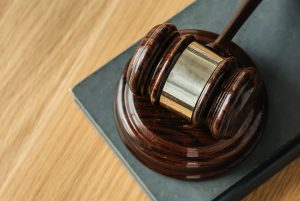Ethicon filed a motion for summary judgment on one of the Panduit factors that are necessary to obtain lost profits. In its motion, Ethicon contended that Covidien’s alleged non-infringing alternatives were neither acceptable nor available.
 In evaluating the motion, the district court explained that a “noninfringing alternative need not be on the market during the infringement period to factor into a lost profits analysis.” Wechsler v. Macke Intern. Trade, Inc., 486 F.3d 1286, 1298 (Fed. Cir. 2007). But the district court also noted that where an alleged non-infringing alternative was not on the market during the relevant time period, “a trial court may reasonably infer that it was not available as a non-infringing substitute at that time. The accused infringer then has the burden to overcome this inference by showing that the substitute was available.” Grain Processing, 185 F.3d at 1353 (citation omitted). Moreover, “[t]he acceptable substitute element, though it is to be considered, must be viewed with limited influence where infringer knowingly made and sold the patented product for years while ignoring the substitute.” Panduit, 575 F.2d at 1162, n.9.
In evaluating the motion, the district court explained that a “noninfringing alternative need not be on the market during the infringement period to factor into a lost profits analysis.” Wechsler v. Macke Intern. Trade, Inc., 486 F.3d 1286, 1298 (Fed. Cir. 2007). But the district court also noted that where an alleged non-infringing alternative was not on the market during the relevant time period, “a trial court may reasonably infer that it was not available as a non-infringing substitute at that time. The accused infringer then has the burden to overcome this inference by showing that the substitute was available.” Grain Processing, 185 F.3d at 1353 (citation omitted). Moreover, “[t]he acceptable substitute element, though it is to be considered, must be viewed with limited influence where infringer knowingly made and sold the patented product for years while ignoring the substitute.” Panduit, 575 F.2d at 1162, n.9.
Covidien did not dispute that its alleged non-infringing alternatives were not on the market during the relevant time period and, therefore, Covidien bore the burden to overcome the inference of non-availability. See Grain Processing, 185 F.3d at 1353. Covidien contended that at least two non-infringing alternatives to its allegedly infringing device were available during the relevant time period. However, the district court noted that the record showed that it would between 46 and 62 weeks to develop such a non-infringing alternative.
Thus, the district court concluded that “it is undisputed, based on Covidien’s own estimates, that it would have taken over 10 months to design around the [patent-in-suit]—well over twice the time required to produce an alternative (which was deemed unavailable) in Micro Chem. The Court finds that this clearly shows that Covidien’s posited non-infringing alternatives were unavailable at the time of infringement. Covidien has not come close to overcome the inference of non-availability, therefore the alleged non-infringing alternative devices were not available as a matter of law.”
As a result, the district court granted the motion for summary judgment of absence of acceptable and available non-infringing alternatives.
The authors of www.PatentLawyerBlog.com are patent trial lawyers at Jeffer Mangels Butler & Mitchell LLP. For more information about this case, contact Stan Gibson at 310.201.3548 or SGibson@jmbm.com.
 Patent Lawyer Blog
Patent Lawyer Blog

